|
500 Abbey Road
Abbey Wood
https://whatpub.com/harrow-inn
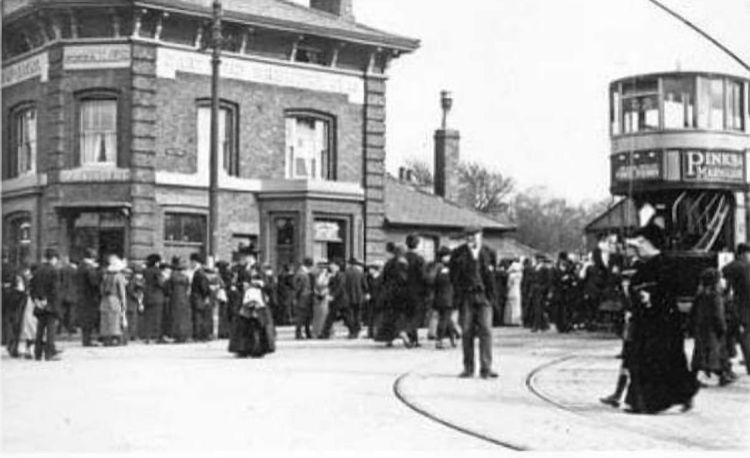
Above photo, 1910. |
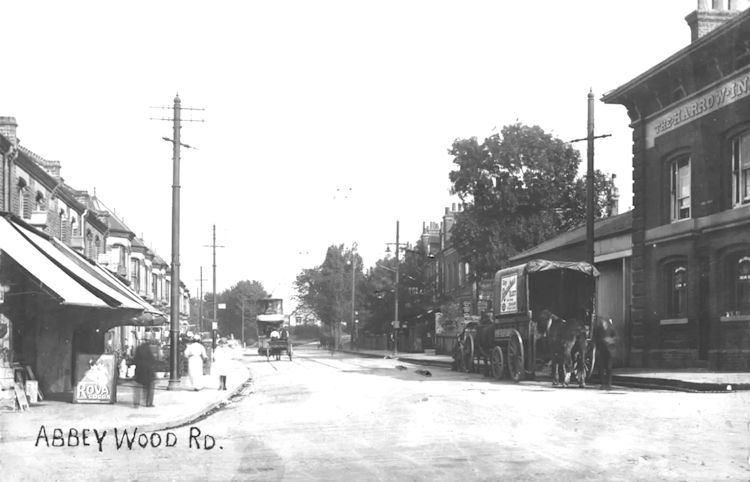
Above postcard circa 1912, kindly sent by Rory Kehoe. Until
1904, the Harrow had been a tied house, within the estate of Thomas
Norfolk's Deptford Brewery, London SE8. In 1904, Norfolk's Brewery,
along with its estate of 55 tied houses, was acquired by the Dartford
Brewery Company, which gave them an important presence in the lucrative
S E London pub trade. Outside the Harrow is a horse-drawn Pickford's
wagon. Given that the pub changed hands in 1913, could this photograph
have captured part of the process of the former licensee leaving and/or
the new one moving in?
It
appears that the pub was a tied house within the estate of Barclay,
Perkin's Southwark Brewery. Following a number of mid-20th century
mergers and later rebrands, the Harrow would have had its livery
altered, firstly to show it as a Courage and Barclay house, switching
then to Courage, Barclay, Simonds and finally, becoming just a plain old
Courage pub. |
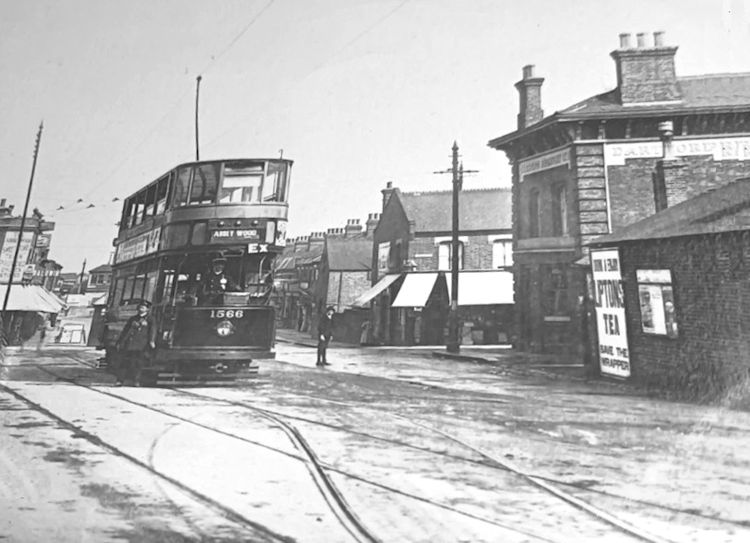
Above photo, circa 1913, kindly sent by Rory Kehoe. Showing the "Harrow"
to the right of the tram. Carved into the pub's fascia are the words
Dartford Brewery Company, indicating that the "Harrow" was one of their
tied houses. |

Above postcard, date unknown. |
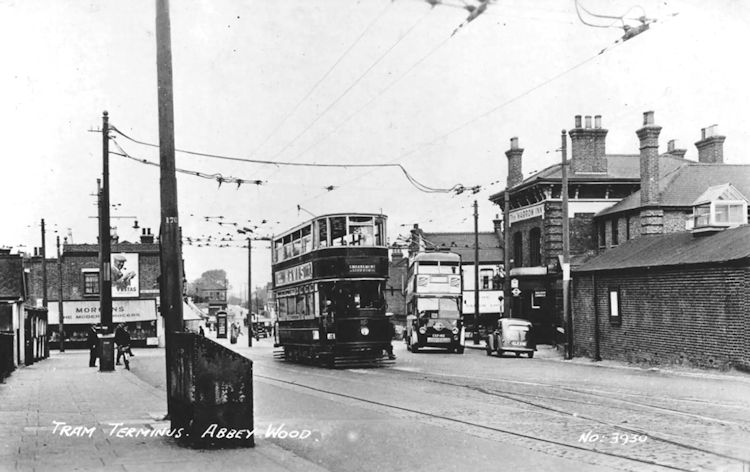
Above postcard, circa 1921, kindly sent by Rory Kehoe. |

Above photo, date unknown. |

Above photo, 2006 by Steve Thoroughgood. |
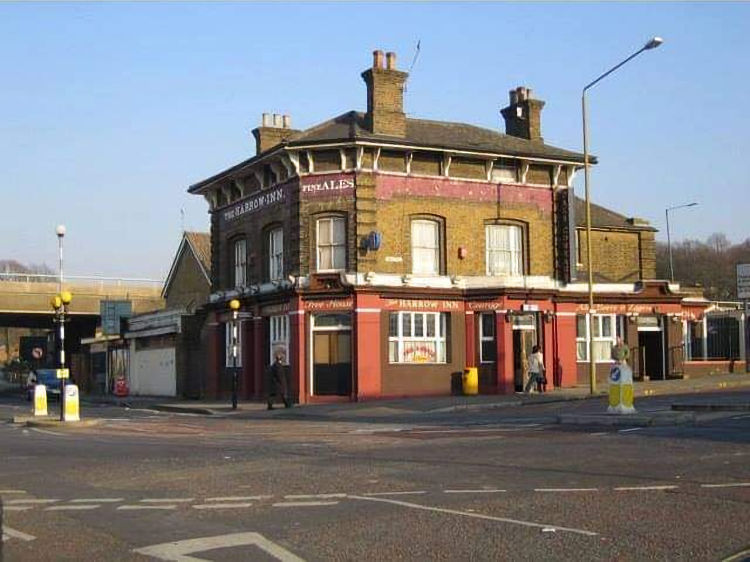
Above photo, circa 2007. |

Above Google image, June 2016. |
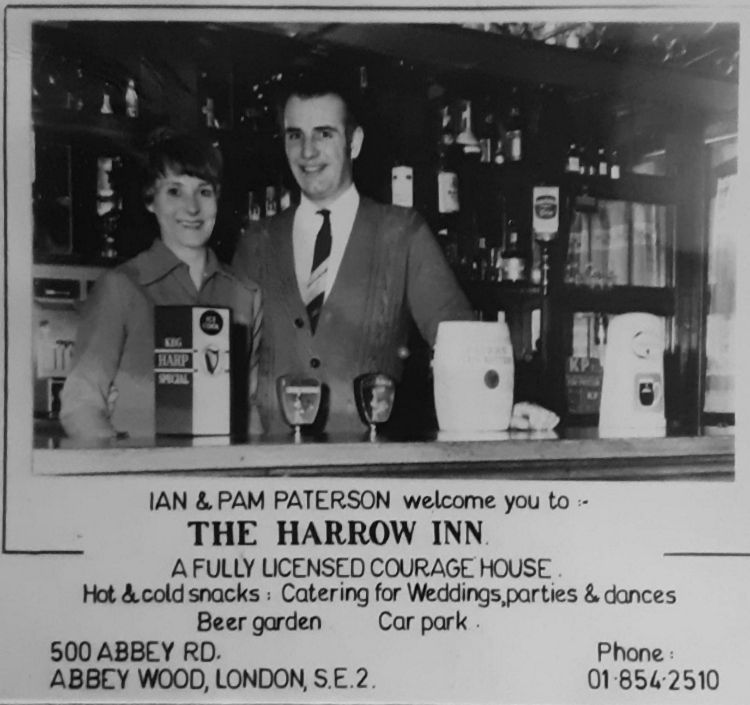
Above card, date unknown. |
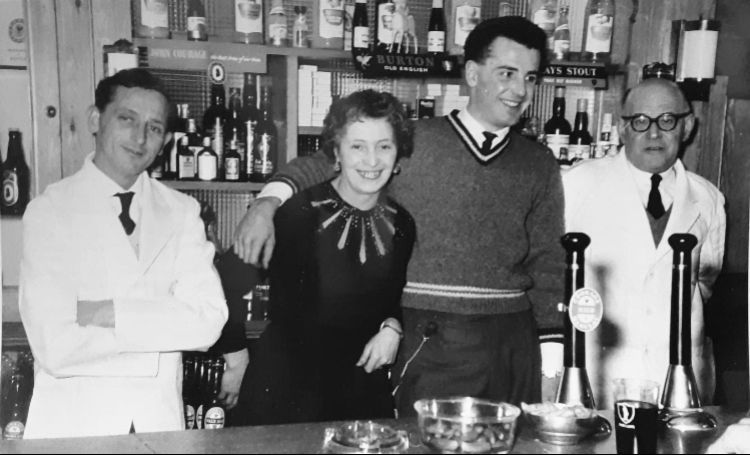
Above photo, date unknown. |
Mike Payne tells me that this pub was originally in the parish of Erith
and is not to be confused with the "Harrow
Inn" in Crayford which was often regarded as an Erith pub, being closer
to the centre of Erith than the centre of Crayford.
Abbey Wood now being Greater London from 1965 but was part of Kent prior
to that, I will be focussing my research on Kent itself, but as the information is found or sent to me, including photographs, it will
be shown here.
Thanks for your co-operation. All emails are answered.
|
From the Southeastern Gazette, 24 July 1866.
ABBEY WOOD. Fatal Accident while Bathing.
An inquest was held at the “Harrow Inn,” Abbey Wood, on Monday, before
C. J. Carttar, Esq„ coroner, on the body of Walter Gurling, aged 19,
under gamekeeper to Mr. White, Abbey Wood, who was drowned while bathing
in a pond in the grounds. It appeared that the deceased and two friends,
who had come from Woolwich to spend the day with him, went to bath in a
pond in the wood. The water being in some parts nine feet deep, the
deceased got out of his depth, and being unable to swim, began to sink.
One of his companions attempted to rescue him, but without effect, and
he himself had a narrow escape of being drowned. The body of the
deceased was some time afterwards dragged from the pond by the use of
the garden rake.
The jury returned a verdict of “Accidentally drowned.”
|
|
Bexley Heath and Erith Observer, Saturday 5 July, 1879.
Abbey Wood. The Alleged Murder.
An inquest was held at the "Harrow Inn," Abbey Wood, on Friday afternoon
upon the body of the wife of Charles Hardy, who was found dead on the
previous Wednesday, and the circumstances related in our last, the
husband of deceased being then in custody on the charge of Murder.
The following was sworn in as the jury. Messrs. R. Lambert (foreman), F.
Webb, C. Ginger, Warren Smith, A. Bowie, F. Idenden, G. Stapley, A.
Skinner, H. Cook, W. Whitmore, W. Keeler, W. J. Cross, J. Millington, L.
Vickery.
The jury procedure to view the body, and on their return the witnesses
Emily Smith and her mother, and Edwin Haynes repeated in substance the
evidence they gave before the magistrate.
In reply to the coroner, Emily Smith said she went three times a day
sometimes to assist deceased, and fetch beer and gin for her. Had seen
deceased tipsy, but she did not know that she had ever seen Mr. hardy in
such a state. Heard no quarrel between deceased and her husband on
Wednesday morning before 11 or 12; they were both sober.
By a juror:- Fetched a quartern of gin and two pints of beer on
Wednesday morning. They seemed good friends then.
By Coroner:- Left the table whole and entire when I took the things off.
Inspector Mearing said the police found the table smashed up.
Emily Smith, mother of the girl Smith, said, in reply to the coroner,
she only noticed one mark upon deceased's face, which had been done
outside by falling against a wall. Mr. Hardy told her so; she only knew
from what he told her. When she went in Mr. Hardy was walking about the
room like a crazy man. Deceased was not sober at 9 o'clock in the
morning, when witness went in. Had seen deceased intoxicated several
times. Was sorry to say she was very far from being a sober woman. Could
not say how Mr. Hardy was in this way, as she had been very little in
his company. Mr. Hardy told her he had cautioned her several times, and
that she had brought it all on herself. On Tuesday evening deceased was
drunk, and would have fallen had she not caught her.
Edwin Haynes and reply to questions, said the deceased and her husband
were quarrelling all night, and the the whole of Wednesday morning, with
intervals. Had never seen Mr. Hardy drunk. He and his wife lived very
unhappily together. Deceased generally commenced quarrying first, and
her husband remained quiet for a time, but when aroused he was like an
enraged lion. Heard him threatened to throw his wife down stairs, and
sounds as if he had done so. Had never seen Mr. Hardy strike or kick
deceased. He heard them quarrelling night and day, for 3-weeks in
succession; deceased had often cried out "murder!" Often when Mr. Hardy
came home he would find the fire out and no dinner awaiting him. Had
seen deceased break the windows. The first night Mr. Hardy and his wife
came into the house they quarrelled, and witness remarked that they had
fine neighbours now.
Mrs. Ann Ayling, a neighbour, spoke to hearing deceased and a husband
quarrelling frequently, and on Wednesday, but had never seen the latter
strike or kick his wife.
P.C. Wilson, 250 R, said he was called at 2:30 p.m. on Wednesday to
deceased and thought she was dead. He said for Dr. Elliot, Belvedere;
but Dr. Spurrell arrived, having been fetched by the husband. He
pronounce life to be extinct. Found the table had been removed to the
wash house; it was broken into pieces.
Mrs. Ayling, recalled, said the table had been very "shaky," and she
thought it had fallen to pieces.
Inspector Collis spoke to arresting Hardy and conducting him to Erith.
On a remark being made that blood had been found upon the throat of
deceased prisoner said was stuff; he had had 20 years of it.
Dr. Spurrell said, on examining the body he observed several bruises
about the chest, face, arms, a black eye, and there was an old bruise up
on the left cheek. There was also a cut on the left shoulder and inch in
length, and the collar bone was broken. There were, in addition, bruises
about the hips. The mouth of deceased was shut, and the teeth were so
firmly fixed that he was unable to separate the jaws. No blood was to be
seen on the body, clothes or about the house, and there was nothing to
bear out the theory of strangulation. On removing the scalp he counted
eight or nine bruises; for the brain was gorged with blood. There were
extensive clots of blood at the base of the brain. The lungs were gorged
with blood; but the organs generally were healthy. There was some slight
signs of the liver being that of a drunkard. He attributed death and
apoplexy, from the effusion of blood found at the base of the brain,
contributed to by the excessive drinking, and perhaps by violence. In
reply to the Coroner, at the request of Inspector Mearing, witness said
death would be accelerated by the bruisers described, but he could not
say that they were the cause of death. Many of the bruises were of
long-standing. The brain was unhealthy, and a violent fall would cause
death when in such a states. The bruise at the top of the chest was
slight. The collar bone, he thought, might have been broken by a fall,
as deceased was a heavy woman.
Inspector Mearing put in a letter from Mr. Frank Soaper, late surgeon to
the convict prison, Gibraltar, stating that the deceased had been under
his care many times from the effects of intemperance, and was a
fearfully violent woman - a perfect maniac in abuse. Hardy he described
as a steady, upright fellow.
The Coroner summed up, the jury were left to deliberate, and in about
half an hour a verdict was returned of "Death from apoplexy, accelerated
by habits of intemperance."
|
I am informed that the pub closed for some time but in 1971 an off
licence was being operating at 498 Abbey Road by Arthur Cooper.
The building was demolished May 2009.
|
From the
https://www.bexleytimes.co.uk 4 June 2009.
Historic pub demolished.
A LANDMARK pub with a history dating back 300 years has been demolished.
Developers HFHA Ltd this week admitted it has no plans in the pipeline
to redevelop the Harrow Inn pub site, in Abbey Wood Road which was
bulldozed last month.
The British Beer and Pub association reported on Tuesday that some six
pubs close in Britain every day, blaming disproportionate EU taxes for
the decline.
A former regular at the pub, Colin Manning, 26, of Abbey Wood Road,
said: "It's a real shame. Pubs like this are disappearing right from
under your nose.
"We can see from old pictures that this used to be a real landmark for
the area. With a Crossrail station opening eventually you'd think they'd
want to keep some old culture. Our councillor did get it locally listed,
but that didn't seem to help save it. No one knows what their plans are
for it now."
HFHA has taken on a number of old south London pubs to develop into
flats.
It has twice submitted unsuccessful planning applications to build flats
on the Harrow Inn, which is thought to have existed on the lot in
various forms since 1715.
The decision to demolish the building was made due to 'safety concerns',
though Mr Manning said the site had for a period been left unlocked.
Fancyapint.com described the pub as "a moderately rough locals' pub with
quite the mankiest beer 'garden' that we recall seeing in a long time".
However its demolition was lamented on a Facebook group set up by Mr
Manning called RIP The Harrow Inn 1715-2009, where residents recalled
the loss of pubs like the "Abbeymead" and the
"Pegasus."
Jeanie Oliver-Brown, from Abbey Wood, said: "This is a sad loss for the
original Abbey Wood Village."
The agent responsible for the site was not available for comment as the
Times went to press.
An HFHA spokesman said: "There are no plans for the site at the moment.
We acquire sites and then put together different schemes so we can
either sell them or complete the scheme and operate on it."
|
|
From the
https://www.newsshopper.co.uk By Tom Bull, 27th August 2019.
Harrow Inn Abbey Wood: Peabody put housing plans to council.

Major plans to redevelop a former pub in Abbey Wood into a ten-storey
tower block have been submitted.
Peabody have put forward a scheme for 66 flats and shops set across a
building climbing from three to ten storeys.
The site in Abbey Wood Road has been subject to several planning
applications in the past, including a much larger scheme for hundreds of
homes, which was eventually withdrawn by the applicant.
Abbey Wood, Thamesmead and Belvedere are set to be subject for major
developments in coming years as developers look to benefit from the
arrival of Crossrail.
Peabody said in its planning application: “The 66 new homes proposed
will deliver much needed additional housing and will significantly
improve the design quality of the area.
“The proposal will also deliver investment, environmental improvement
and regeneration.
“The proposal will deliver a number of key planning benefits including
making optimum use of this brownfield site and visual amenity
improvements.”
Peabody say residents will benefit from regeneration brought by new
shops, which will also bring jobs.
The developer, which owns the site, has proposed 31 one-bedroom homes,
20 two-bed and 15 three bedroom flats.
Peabody has earmarked 38 per cent of the new homes to be affordable,
split between 78 per cent affordable rent and 22 intermediate.
The plans for The Harrow Inn site will be discussed by councillors in
the coming months.
|
LICENSEE LIST
BECKLY/BECKLEY/BECKLING James 1841-51 (age 70 in 1851 ) )
SEAKER Sophia 1851+
SEAKER James 1861+ 
WEST John 1867-91+ (age 69 in 1891 ) )
EVANS Frank Mar/1894+
MACQUIRE Sarah 1901+ (age 27 in 1901 ) )
VINCENT Alfred 1903+

MOGRIDGE Isabella Mrs 1913-22+
PATERSON Ian & Pam ????
https://pubwiki.co.uk/HarrowInn.shtml
 Census Census
 From the Kelly's Directory 1903 From the Kelly's Directory 1903
|











